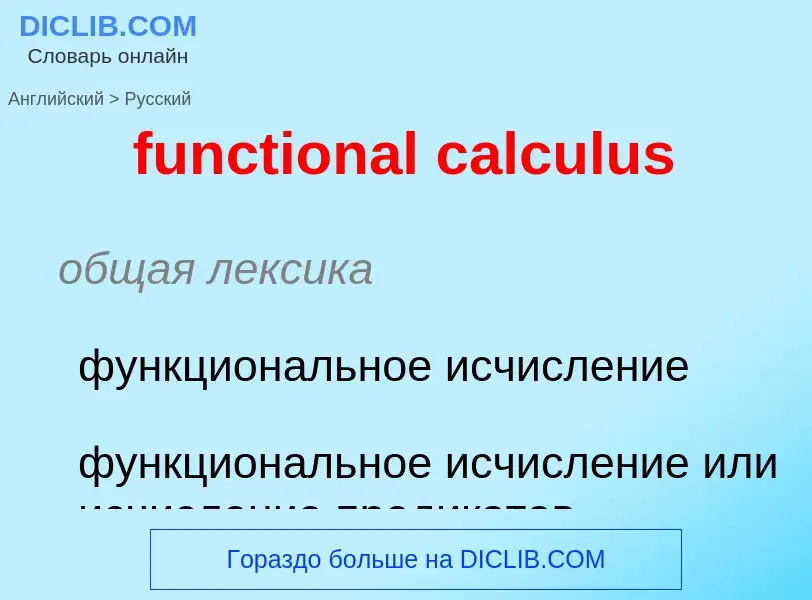Μετάφραση και ανάλυση λέξεων από την τεχνητή νοημοσύνη ChatGPT
Σε αυτήν τη σελίδα μπορείτε να λάβετε μια λεπτομερή ανάλυση μιας λέξης ή μιας φράσης, η οποία δημιουργήθηκε χρησιμοποιώντας το ChatGPT, την καλύτερη τεχνολογία τεχνητής νοημοσύνης μέχρι σήμερα:
- πώς χρησιμοποιείται η λέξη
- συχνότητα χρήσης
- χρησιμοποιείται πιο συχνά στον προφορικό ή γραπτό λόγο
- επιλογές μετάφρασης λέξεων
- παραδείγματα χρήσης (πολλές φράσεις με μετάφραση)
- ετυμολογία
functional calculus - translation to ρωσικά
общая лексика
функциональное исчисление
функциональное исчисление или исчисление предикатов
математика
пропозициональная логика
Ορισμός
Βικιπαίδεια
In mathematics, a functional calculus is a theory allowing one to apply mathematical functions to mathematical operators. It is now a branch (more accurately, several related areas) of the field of functional analysis, connected with spectral theory. (Historically, the term was also used synonymously with calculus of variations; this usage is obsolete, except for functional derivative. Sometimes it is used in relation to types of functional equations, or in logic for systems of predicate calculus.)
If is a function, say a numerical function of a real number, and is an operator, there is no particular reason why the expression should make sense. If it does, then we are no longer using on its original function domain. In the tradition of operational calculus, algebraic expressions in operators are handled irrespective of their meaning. This passes nearly unnoticed if we talk about 'squaring a matrix', though, which is the case of and an matrix. The idea of a functional calculus is to create a principled approach to this kind of overloading of the notation.
The most immediate case is to apply polynomial functions to a square matrix, extending what has just been discussed. In the finite-dimensional case, the polynomial functional calculus yields quite a bit of information about the operator. For example, consider the family of polynomials which annihilates an operator . This family is an ideal in the ring of polynomials. Furthermore, it is a nontrivial ideal: let be the finite dimension of the algebra of matrices, then is linearly dependent. So for some scalars , not all equal to 0. This implies that the polynomial lies in the ideal. Since the ring of polynomials is a principal ideal domain, this ideal is generated by some polynomial . Multiplying by a unit if necessary, we can choose to be monic. When this is done, the polynomial is precisely the minimal polynomial of . This polynomial gives deep information about . For instance, a scalar is an eigenvalue of if and only if is a root of . Also, sometimes can be used to calculate the exponential of efficiently.
The polynomial calculus is not as informative in the infinite-dimensional case. Consider the unilateral shift with the polynomials calculus; the ideal defined above is now trivial. Thus one is interested in functional calculi more general than polynomials. The subject is closely linked to spectral theory, since for a diagonal matrix or multiplication operator, it is rather clear what the definitions should be.

